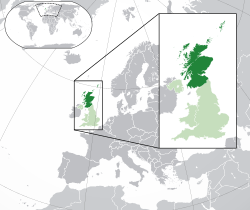 | |
| Agency overview | |
|---|---|
| Formed | 2005 |
| Type | executive non-departmental public body |
| Jurisdiction | Scotland |
| Headquarters | 7 Thread Street, Paisley PA1 1JR |
| Minister responsible | |
| Agency executives |
|
| Parent department | |
| Website | www |
| Map | |
 Scotland in the UK and Europe | |
The Risk Management Authority is an executive non-departmental public body of the Scottish Government with responsibility for assessing and managing the risks posed by certain serious violent and sexual offenders in Scotland. It was established in 2005 by the Criminal Justice (Scotland) Act 2003.
Contents
The authority is required to assess the risk posed by serious offenders at sentencing when the High Court of Justiciary will issue a Risk Assessment Order, and will provide a Risk Assessment Report to the High Court. The judge may then issue an Order for Lifelong Restriction, at which point the authority will have to draw up a risk management plan for the offender.
The authority is based in Paisley.
